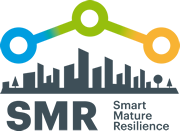The SMR project team has received first prize at two award ceremonies this month for its innovative and effective standardisation activities. On 13 November 2019, the team was awarded the CEN-CENELEC Standards + Innovation Award at an award ceremony in Brussels. The project’s scientific coordinator Jose Julio Gonzelez accepted the award on behalf of the project partners.
CEN and CENELEC’s Standards+Innovation Awards acknowledge the important contribution of research and innovation to standardization and celebrate the contributions of researchers, innovators and entrepreneurs to standardization. The European Committee for Standardization (CEN) and the European Committee for Electrotechnical Standardization (CENELEC) are two of the three officially recognized European Standardization Organizations.
The previous week, Holger Robrecht, Vasilis Latinos and Clara Grimes were awarded the DIN Innovators Award 2019 for their work on standardisation as part of the SMR at a ceremony in Berlin (Germany). The award ceremony was held on 7 November and was organised by the Deutsches Institut für Normung (DIN), which is the German national organisation for standardisation.
The annual DIN Innovators Award is open to initiators of standardisation activities in which research results have been transferred to the market, or who have supported the launch of a new product or service. The award aims to highlight the relevance of standardisation on innovations’ long-term success and to recognise the achievements of experts and initiators in this area.
Due to a high degree of competence both in standardisation and in the topic of urban resilience, as well as an open and collaborative process adapted to the needs and conditions of local governments, SMR carried out led an exceptionally successful standardisation process resulting in three new pre-standardisation documents that focus on City Resilience Development and contribute to standards at the international ISO level. The CEN Workshop Agreement titled CWA 17300 City Resilience Development – Operational Guidance defines an operational framework for cities, provides guidance on local resilience planning and supports their efforts in building resilience. The CWA 17301 Maturity Model allows evaluation of cities’ resilience performance, and the CWA 17302 Information Portal serves as a reference including information on cities’ local resilience.
The project, a Horizon 2020 Success Story, was also noted for the inclusion of a large number of project-external cities and experts in the standardisation process.
Holger Robrecht, Deputy Regional Director of ICLEI Europe said, “we celebrate this award for Jose Maria Sarriegi of the Technical University of Navarra, coordinator and mentor of SMR, who passed away much too early. It will be his legacy to help as many cities as possible raising their resilience bar and supporting life-quality and security of people in Europe and elsewhere.”



